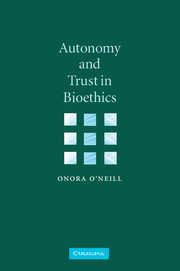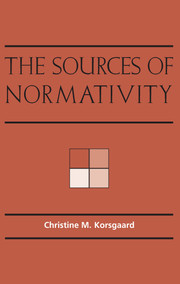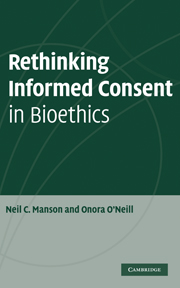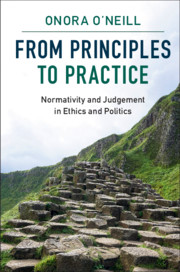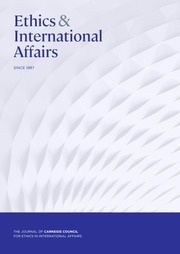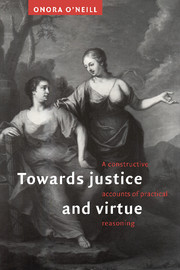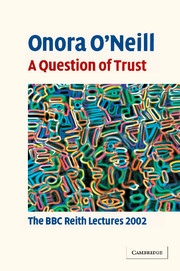Autonomy and Trust in Bioethics
- Author: Onora O'Neill, Newnham College, Cambridge
- Date Published: April 2002
- availability: Available
- format: Paperback
- isbn: 9780521894531
Paperback
Other available formats:
Hardback, eBook
Looking for an inspection copy?
This title is not currently available on inspection
-
Why has autonomy been a leading idea in philosophical writing on bioethics, and why has trust been marginal? In this important book, Onora O'Neill suggests that the conceptions of individual autonomy so widely relied on in bioethics are philosophically and ethically inadequate, and that they undermine rather than support relations of trust. She shows how Kant's non-individualistic view of autonomy provides a stronger basis for an approach to medicine, science and biotechnology, and does not marginalize untrustworthiness, while also explaining why trustworthy individuals and institutions are often undeservingly mistrusted. Her arguments are illustrated with issues raised by practices such as the use of genetic information by the police or insurers, research using human tissues, uses of new reproductive technologies, and media practices for reporting on medicine, science and technology. Autonomy and Trust in Bioethics will appeal to a wide range of readers in ethics, bioethics and related disciplines.
Read more- Author is a leading moral and political philosopher with considerable public visibility
- She has delivered the BBC Reith Lectures on a topic related to this one with lots of coverage
- She draws on numerous examples involving such topical issues as the use of genetic information, the use of new reproductive technologies, and media practice for reporting on science, medicine and technology
Reviews & endorsements
'Amid so much hype and yammer in the suddenly fashionable field of bioethics, it is good to turn to a book by a professional philosopher with wide experience of how biomedical regulation works in practice … It should be read by everyone concerned with this topic.' The Economist
See more reviews'It is the mark of a truly good book that it stimulates criticism as well as agreement and praise … The book is a notable contribution to understanding of the most important task facing those responsible for the NHS - to maintain trust where is exists (as it does in most cases) or to restore trust where it has lapsed.' Douglas Black, Journal of the Royal Society of Medicine
'They are alike … not only in dealing with the topic of trust, but also in their sharp intelligence, their refusal to accept received opinion without examination and their humane common sense. The combination of serious philosophical discussion with journalistic presentational skills has been brought to a fine art by O'Neill … if anything is transparent, it is the truthfulness and good sense of this most admirable lecturer' Baroness Warnock, The Times Higher Education Supplement
'This is a philosopher's account of what is a far more complex subject than may at first appear. Fortunately Onora O'Neill is one of the few philosophers who can write with the clarity to make her arguments very accessible, which will make this book particularly appealing to a much wider audience than philosophers … Thought provoking and stimulating.' Bulletin of Medical Ethics
'The book is marked throughout by Professor O'Neill's customary mixture of clarity, forthrightness and common sense, and by an impressive determination to relate careful philosophy to actual practice and experience … Autonomy and Trust in Bioethics provides a rich and stimulating basis for further debate in this area, and broadens the focus of discussion in a stimulating way. Even if non-Kantians remain unpersuaded by some of the philosophical moves, they will appreciate the lucidity, learning and good sense of this interesting book.' The Heythrop Journal
Customer reviews
Not yet reviewed
Be the first to review
Review was not posted due to profanity
×Product details
- Date Published: April 2002
- format: Paperback
- isbn: 9780521894531
- length: 228 pages
- dimensions: 229 x 154 x 13 mm
- weight: 0.33kg
- contains: 1 b/w illus.
- availability: Available
Table of Contents
Preface
Frontispiece
1. Gaining autonomy and losing trust?
2. Autonomy, individuality and consent
3. 'Reproductive autonomy' and new technologies
4. Principled autonomy
5. Principled autonomy and genetic technologies
6. The quest for trustworthiness
7. Trust and the limits of consent
8. Trust and communication: the media and bioethics
Bibliography
Institutional bibliography
Index.
Sorry, this resource is locked
Please register or sign in to request access. If you are having problems accessing these resources please email [email protected]
Register Sign in» Proceed
You are now leaving the Cambridge University Press website. Your eBook purchase and download will be completed by our partner www.ebooks.com. Please see the permission section of the www.ebooks.com catalogue page for details of the print & copy limits on our eBooks.
Continue ×Are you sure you want to delete your account?
This cannot be undone.
Thank you for your feedback which will help us improve our service.
If you requested a response, we will make sure to get back to you shortly.
×
